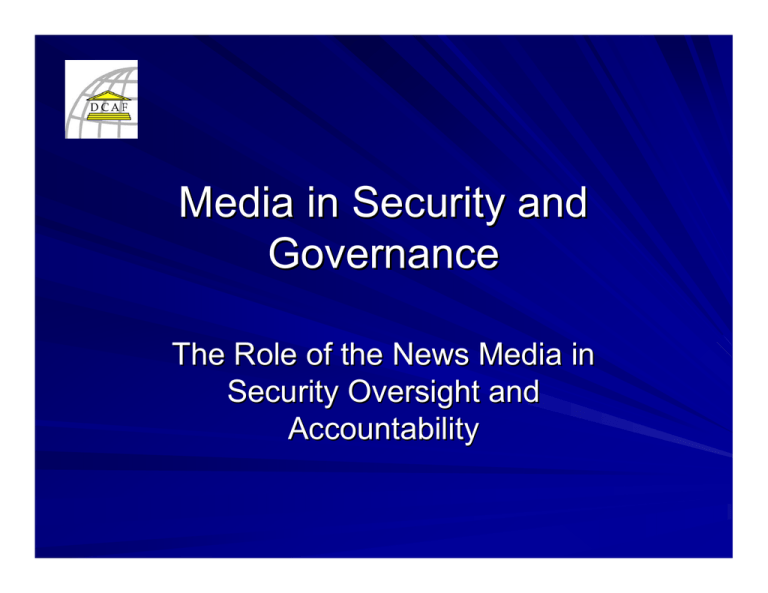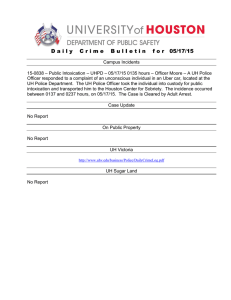Media in Securit y and
advertisement

Media in Security and Governance The Role of the News Media in Security Oversight and Accountability Definition Key element in democracies, shape public debate on security policy & decision-making A tool for informing and educating the public Relationship with policy-makers are often complicated. Government/officials may delay or block the information. Tensions due to differing institutional cultures and goals What role do Media play in governance of the security sector? What are their relationships with main security providers? What are the obstacles to provide effective oversight of security institutions? Related Conventions Sofia Convention (1997) -15 Articles - Freedom of the Press Universal Declaration of Human Rights (1948) Geneva Conventions (1949)+Additional Protocols (1977) 1) Media in Conflict In times of war/troubles, can be a device in the hands of totalitarian interests.However, they can have a positive influence. End of Cold War: a vacuum in policy information filled by media. «CNN Effect» = pressure on decision makers caused by the growth of real time news and information 1)a. Negative Effects «side effects» are: propaganda patriotic exhibition Media in conflict societies often create and facilitate arguments for conflict Influence people: eliminate the barrier of illiteracy, citizens are influenced by newspapers and thus likely to believe what they say Danger of « sensationalising » conflict with reporting. Ex: The First Iraq War. Media reinforce elite consensus. Also seem to exacerbate tensions in certain situations and areas. 1)b. Positive Effects Media as a facilitator of positive social change Importance of journalism training for political stability (Ex: Bosnia-Herzegovina in 2001) Media as mediator = educates, corrects misperceptions, better understanding of the situation 1)c.Media as Mediator News Media can deliver an essential requisite of conflict resolution Provide an outlet, offer solutions and build confidence Potential for contributing to conflict resolution 2. Media and the Police Many police services established media relations offices in order to manage relationships with journalists. Police: provider of public security & direct effect on people’s safety. Media scrutiny facilitates police accountability Spread of mass communication technology has affected the context of accountability (video cameras, street controls …) 2)a. Tensed relationships Journalists have to be discreet while investigating cases. Irresponsibility can inflame tensions in a community and damage police-community relations. Mutual dependency, difference in values & roles. 2)b. Effects of Media on Police Do the media have an effect on the practices of policing and if so, which one? Limited impact on police accountability: no power over police, differ from internal /external mechanisms Communicative power, major source of information, images. Tendency to exaggerate the danger Attention to media and how they depict the police (ineffectiveness, misuse of weapons when arresting people, corrupted officers) Police argue that the description of events is inaccurate,biased, etc.. Can be «catalysts» for reform but indirectly only Because of media, police is forced to be more « forthcoming » SUMMARY: Media enable a social construction of policing which is more complex (good, bad behaviour) Can lead to political efforts at reform, which then have a legal and political basis for insisting that police fix a problem. Little impact on street officers. Slight impact on policy accountability (no report on policy issues) Lack of direct oversight over police conduct Can’t tell the police what to do Still a free and well-resourced media is needed to democratic life. 3. Media and Intelligence What are their relations? What’s the role of Media? Intelligence agencies: culture of secrecy = Low visibility of activities Media oversight of intelligence agencies is challenging + No real knowledge on the subject in the journalism field. Media can play an important role in monitoring security & intelligence agencies Over- reliance on official documents - Can cause «scandals»: 1974 CIA wrongdoing - Sources can be manipulated: WMDs case in 2003 (Iraq) Main challenge for intelligence services is to maintain secrecy while getting the public support Ways to enhance relations Best way to enhance intelligence-media relationship is to educate the public about the role of the agencies Credibility should be built SUMMARY: The intelligence sector is the most challenging of areas for Media oversight because of secrecy 4. Media and the Military Military needs Media in order to inform the public about its role and maintain public support Media are dependent on the Military for information Media/ Military relations differ in 3 situations: Peacetime Times of crisis / war Conduct of operations 4)a. Peacetime Media Provide feedback to government about security policy Help build public support regarding defence policy Armed forces have to inform the public on a regular basis 4)b. Times of War Filter for communication on military strategies but restrictions from governments and armed forces: War correspondents: often censored System of «embedding» journalists, practised in WW II, Vietnam and Gulf War can improve cooperation but jeopardize objectivity 4)c. Operations «Information Operations» (IO) = information as a weapon in wartime Dependence of the military upon communications technology Truth telling,but sometimes problems too (Bombing of the Serb TV Channel RTS by NATO seen as a « crime against freedom of speech ») Influence on the way the war is conducted Risk of confusion Growing impact of commercialism on the media Human Rights Issues Covering wars is a dangerous business, threat to physical safety Limited protection under International Humanitarian Law = Non-combatants Threat to right to information (Art.19 of Universal Declaration of Human Rights) Journalists need to be able to: Move freely Report openly Talk honestly 5. Media and Ethics Importance of ethics understood by journalists. Independence, thoughtfulness,decency are main principles The democratic press focuses on freedom, publicity, debate and human rights. Difficulty to report the world and keep ethics at same time Sofia Convention Extracts: « We reiterate that the establishment and fostering of independent, pluralistic and free media is essential to the development and preservation of democracy » « We consider all forms of censorship (…) unacceptable» Art. 2: «All States should provide (….) legal guarantees of freedom of expression and of press freedom » Art. 4: « Free access to information from public authorities must be granted.No journalist should be forced to reveal sources of information » Art. 9: «(….) The access to and the use of these new media should be afforded the same freedom of expression protections as traditional media » The Sofia Convention highlights Art. 19 of the Universal Declaration of Human Rights (1948), which enshrines the « freedom to hold opinions without interference and seek, receive and impart information and ideas through any media » Conclusion One of the missions of Media is to maintain the transparency of democratic institutions and to be a « watchdog ». Media as « 4th State », 3 others: Legislative Judiciary Executive The Media and Security Sector are mutually dependent and must cooperate to educate the public and hold government to account over security policy


